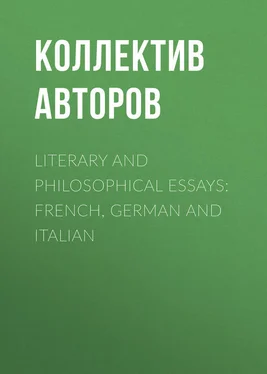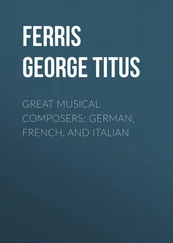Коллектив авторов - Literary and Philosophical Essays - French, German and Italian
Здесь есть возможность читать онлайн «Коллектив авторов - Literary and Philosophical Essays - French, German and Italian» — ознакомительный отрывок электронной книги совершенно бесплатно, а после прочтения отрывка купить полную версию. В некоторых случаях можно слушать аудио, скачать через торрент в формате fb2 и присутствует краткое содержание. Жанр: Философия, foreign_antique, foreign_prose, на английском языке. Описание произведения, (предисловие) а так же отзывы посетителей доступны на портале библиотеки ЛибКат.
- Название:Literary and Philosophical Essays: French, German and Italian
- Автор:
- Жанр:
- Год:неизвестен
- ISBN:нет данных
- Рейтинг книги:5 / 5. Голосов: 1
-
Избранное:Добавить в избранное
- Отзывы:
-
Ваша оценка:
- 100
- 1
- 2
- 3
- 4
- 5
Literary and Philosophical Essays: French, German and Italian: краткое содержание, описание и аннотация
Предлагаем к чтению аннотацию, описание, краткое содержание или предисловие (зависит от того, что написал сам автор книги «Literary and Philosophical Essays: French, German and Italian»). Если вы не нашли необходимую информацию о книге — напишите в комментариях, мы постараемся отыскать её.
Literary and Philosophical Essays: French, German and Italian — читать онлайн ознакомительный отрывок
Ниже представлен текст книги, разбитый по страницам. Система сохранения места последней прочитанной страницы, позволяет с удобством читать онлайн бесплатно книгу «Literary and Philosophical Essays: French, German and Italian», без необходимости каждый раз заново искать на чём Вы остановились. Поставьте закладку, и сможете в любой момент перейти на страницу, на которой закончили чтение.
Интервал:
Закладка:
Nempe et fugacem persequitur virum,
Nec parcit imbellis juventae
Poplitibus, timidoque tergo.
Shee persecutes the man that flies,
Shee spares not weake youth to surprise,
But on their hammes and backe turn'd plies.
And that no temper of cuirace [Footnote: Cuirass.] may shield or defend you,
Ille licet ferro cauius se condat et aere,
Mors tamen inclusum protraket inde caput.
Though he with yron and brasse his head empale,
Yet death his head enclosed thence will hale.
Let us learne to stand, and combat her with a resolute minde. And being to take the greatest advantage she hath upon us from her, let us take a cleane contrary way from the common, let us remove her strangenesse from her, let us converse, frequent, and acquaint our selves with her, let us have nothing so much in minde as death, let us at all times and seasons, and in the ugliest manner that may be, yea with all faces shapen and represent the same unto our imagination. At the stumbling of a horse, at the fall of a stone, at the least prick with a pinne, let us presently ruminate and say with our selves, what if it were death it selfe? and thereupon let us take heart of grace, and call our wits together to confront her. Amiddest our bankets, feasts, and pleasures, let us ever have this restraint or object before us, that is, the remembrance of our condition, and let not pleasure so much mislead or transport us, that we altogether neglect or forget, how many waies, our joyes, or our feastings, be subject unto death, and by how many hold-fasts shee threatens us and them. So did the AEgyptians, who in the middest of their banquetings, and in the full of their greatest cheere, caused the anatomie [Footnote: Skeleton] of a dead man to be brought before them, as a memorandum and warning to their guests.
Omnem crede diem tibi diluxisse supremum,
Grata superveniet; quae non sperabitur, hora?
Thinke every day shines on thee as thy last,
Welcome it will come, whereof hope was past.
It is uncertaine where death looks for us; let us expect her everie where: the premeditation of death, is a forethinking of libertie. He who hath learned to die, hath unlearned to serve. There is no evill in life, for him that hath well conceived, how the privation of life is no evill. To know how to die, doth free us from all subjection and constraint. Paulus AEmilius answered one, whom that miserable king of Macedon his prisoner sent to entreat him he would not lead him in triumph, "Let him make that request unto himselfe." Verily, if Nature afford not some helpe in all things, it is very hard that art and industrie should goe farre before. Of my selfe, I am not much given to melancholy, but rather to dreaming and sluggishness. There is nothing wherewith I have ever more entertained my selfe, than with the imaginations of death, yea in the most licentious times of my age.
Iucundum, cum atas florida ver ageret
When my age flourishing
Did spend its pleasant spring.
Being amongst faire Ladies, and in earnest play, some have thought me busied, or musing with my selfe, how to digest some jealousie, or meditating on the uncertaintie of some conceived hope, when God he knowes, I was entertaining my selfe with the remembrance of some one or other, that but few daies before was taken with a burning fever, and of his sodaine end, comming from such a feast or meeting where I was my selfe, and with his head full of idle conceits, of lore, and merry glee; supposing the same, either sickness or end, to be as neere me as him.
Iam fuerit, nec post, unquam revocare licebit.
Now time would be, no more You can this time restore.
I did no more trouble my selfe or frowne at such conceit, [Idea.] than at any other. It is impossible we should not apprehend or feele some motions or startings at such imaginations at the first, and comming sodainely upon us; but doubtlesse, he that shall manage and meditate upon them with an impartiall eye, they will assuredly, in tract [Course.] of time, become familiar to him: Otherwise, for my part, I should be in continuall feare and agonie; for no man did ever more distrust his life, nor make lesse account of his continuance: Neither can health, which hitherto I have so long enjoied, and which so seldome hath beene crazed, [Enfeebled.] lengthen my hopes, nor any sicknesse shorten them of it. At every minute me thinkes I make an escape. And I uncessantly record unto my selfe, that whatsoever may be done another day, may be effected this day. Truly hazards and dangers doe little or nothing approach us at our end: And if we consider, how many more there remaine, besides this accident, which in number more than millions seeme to threaten us, and hang over us; we shall find, that be we sound or sicke, lustie or weake, at sea or at land, abroad or at home, fighting or at rest, in the middest of a battell or, in our beds, she is ever alike neere unto us. Nemo altero fragilior est, nemo in crastinum sui certior: "No man is weaker then other; none surer of himselfe (to live) till to morrow." Whatsoever I have to doe before death, all leasure to end the same seemeth short unto me, yea were it but of one houre. Some body, not long since turning over my writing tables, found by chance a memoriall of something I would have done after my death: I told him (as indeed it was true), that being but a mile from my house, and in perfect health and lustie, I had made haste to write it, because I could not assure my self I should ever come home in safety: As one that am ever hatching of mine owne thoughts, and place them in my selfe: I am ever prepared about that which I may be: nor can death (come when she please) put me in mind of any new thing. A man should ever, as much as in him lieth, be ready booted to take his journey, and above all things, looke he have then nothing to doe but with himselfe.
Quid brevi fortes jaculamur aevo
Multa:
To aime why are we ever bold,
At many things in so short hold?
For then we shall have worke sufficient, without any more accrease. Some man complaineth more that death doth hinder him from the assured course of an hoped for victorie, than of death it selfe; another cries out, he should give place to her, before he have married his daughter, or directed the course of his childrens bringing up; another bewaileth he must forgoe his wives company; another moaneth the losse of his children, the chiefest commodities of his being. I am now by meanes of the mercy of God in such a taking, that without regret or grieving at any worldly matter, I am prepared to dislodge, whensoever he shall please to call me: I am every where free: my farewell is soone taken of all my friends, except of my selfe. No man did ever pre pare himselfe to quit the world more simply and fully, or more generally spake of all thoughts of it, than I am assured I shall doe. The deadest deaths are the best.
– Miser, de miser (aiunt) omnia ademit.
Vna dies infesta mihi tot praemia vitae:
O wretch, O wretch (friends cry), one day,
All joyes of life hath tane away:
And the builder,
– manent (saith he) opera interrupta, minaeque Murorum ingentes.
The workes unfinisht lie,
And walls that threatned hie.
Интервал:
Закладка:
Похожие книги на «Literary and Philosophical Essays: French, German and Italian»
Представляем Вашему вниманию похожие книги на «Literary and Philosophical Essays: French, German and Italian» списком для выбора. Мы отобрали схожую по названию и смыслу литературу в надежде предоставить читателям больше вариантов отыскать новые, интересные, ещё непрочитанные произведения.
Обсуждение, отзывы о книге «Literary and Philosophical Essays: French, German and Italian» и просто собственные мнения читателей. Оставьте ваши комментарии, напишите, что Вы думаете о произведении, его смысле или главных героях. Укажите что конкретно понравилось, а что нет, и почему Вы так считаете.












